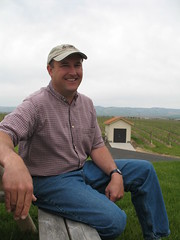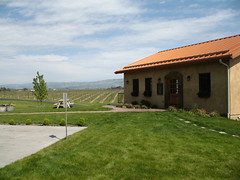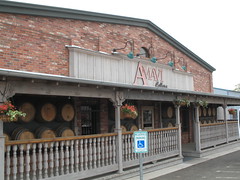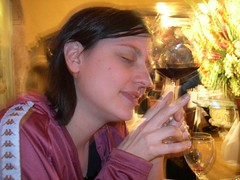Jean-Francois Pellet
 Once I saw the labels again, I immediately remembered both Pepperbridge and Amavi from when I worked in retail. They were described to me as "killer" and "solid", respectively, by a co-worker, but beyond that, I didn't know them from any other of the scores of other Merlots and Cabs at the store.
Once I saw the labels again, I immediately remembered both Pepperbridge and Amavi from when I worked in retail. They were described to me as "killer" and "solid", respectively, by a co-worker, but beyond that, I didn't know them from any other of the scores of other Merlots and Cabs at the store.Let's be honest here. Knowing the story behind a wine label makes the juice inside more interesting. And I'm not talking about those heart-string pulling blurbs on the back of the bottle that some marketing whiz wrote. I mean the real story, which is how the winemaker/viticulturist views what he/she does. Their philosophy about wine.
Everyone's gonna tell you that their goal is to make the best wine possible. But on my travels, I've met a few winemakers with whom I trust that promise wholeheartedly because I see how they take care of their land, their workers, their facilities, and most of all...me. Not only did he take the time to talk with me, but he made damn sure I was connected up with whomever and whatever I needed while visiting Walla Walla. He helped me make reservations at the HoJo's, fer chrissakes. That's way above and beyond.
What does this have to do with his winemaking skills? It ain't such a stretch to imagine that a man who takes care of the people around him (from the workers in the field to the visitors to his winery) also takes care of his fruit and his wine. And the proof is there: the Pepperbridge label, which makes only Merlot and Cab, are big beauties with loads of character that have consistently received high scores.
Holy shit, did I just say "high scores" without snarking? Yeah, I did. We'll get into that later. It comes up a lot in Walla x 2. Stay tuned for that.
Interview with Jean-Francois Pellet, Pepperbridge Winery, Amavi Cellars
Let's go back to the very beginning of your wine experience.
I am a third generation winemaker from Switzerland. So I grew up in this business.
Did you always know this was what you wanted to do?
I think from the beginning, I always knew this was what I wanted to do.
What brought you to the Walla Walla?
Ah, this is a long story.
Go for it.
I got my first degree in viticulture, then I went back to school and got my degree in winemaking. Then I started to get the traveling bug. I worked in Germany in 1984, then after that I went back to Switzerland, then took a job two years in Spain to establish two wineries in the Jumilla, which nobody knew about at the time. This was 1990, 1991. In 1995 I got an opportunity to open a winery in South Africa. And my project failed, but...I had worked in 1988 in Napa as an intern, so I called Heitz Cellars back and said, do you want to hire me as a cellar rat, and they said yes, we will, when can you start? I worked there for four years, and I met Norm McKibben through consulting, and he was starting a project here. I flew here a couple of times in '98, and in '99 we decided to move up here.
What attracted you to this valley?
 The openness. Coming from Switzerland...it's a great country, but it's small and everyone's on top of each other. And look at that. Look at the view we have here. It's acres and acres of land. There's more people moving in here, but it's still pretty open.
The openness. Coming from Switzerland...it's a great country, but it's small and everyone's on top of each other. And look at that. Look at the view we have here. It's acres and acres of land. There's more people moving in here, but it's still pretty open.We were talking earlier about sustainable farming...
Yes. Sustainable is something that is very important to me. As a matter of fact, I was involved with a similar group in Switzerland in the early '90s. We are based on three pillars, and the most important one is enviornment. But we also look at the social aspect, and the income aspect. We are trying to be stewards of the land, this is our goal. We believe that, after eighty years of corporate America, this whole valley was farmed intensively and depleted of a lot of it's good things. So we want to turn the soil back to a better condition.
Explain how sustainable differs from organic farming.
 This is a good question. I think the difference is...we try to be as soft as possible, but at the same time we don't want our hands tied if one year we have a problem. We might have to spray with something a little stronger, and we understand that we might lose three years of trying to reestablish beneficial insects and other things, but we believe--and this is where the economical and actually the social aspects come in--that our goal is to make good wine, and we cannot lose a crop or have a bad crop and make good wine, at the end of the day.
This is a good question. I think the difference is...we try to be as soft as possible, but at the same time we don't want our hands tied if one year we have a problem. We might have to spray with something a little stronger, and we understand that we might lose three years of trying to reestablish beneficial insects and other things, but we believe--and this is where the economical and actually the social aspects come in--that our goal is to make good wine, and we cannot lose a crop or have a bad crop and make good wine, at the end of the day.Talk about your own philosophy about terroir.
Terroir, good question. When Pepperbridge winery was established, we were very focused. We only make two wines here, one Merlot and one Cabernet Sauvignon. And the goal is to make the best wines to showcase our vineyard. We want to make a wine that really reflects, has a sense of place of the Walla Walla valley. We're small, we can afford that. I still travel a lot to go see what others are doing, and now you have a tendency to see a lot of wines that taste the same. And the terroir notion means a lot to me, it means a sense of place. As you know, there's a lot of debate on terroir, but I do think we have a terroir here in Walla Walla. This place has been flooded over fifty times, and we are based on silt and loam soils.
Can you give an example of how it reflects in the structure or flavor of the wine?
At Seven Hills vineyard, we get about seven inches, or nine inches of rainfall a year, and we have about ten to twelve percent clay in the vineyard. We get a lot of red fruit flavors and very silky tannins from here...earthy, graphite, pencil lead quality which I really think reflects the terroir and I really like. Pepperbridge gets a little more rainfall, we're about twelve to fifteen percent...we have more clay as well, and the wine tends to be much more on the darker fruit, like dark cherry especially, and some chocolate characters, and a hint of herbal, you know, thyme, sage. I kinda like that, too.
******
So one of the hookups I got from this lovely gentleman was Justin Wylie, who owns vineyards and a co-op called Va Piano. Read about him next.
Clinkies.
Clinkies.





1 Comments:
From a huge fan of Jean-Francois, thank you for the opportunity to learn a little more of what this artist does with such ease and grace. Cheers!
Post a Comment
<< Home